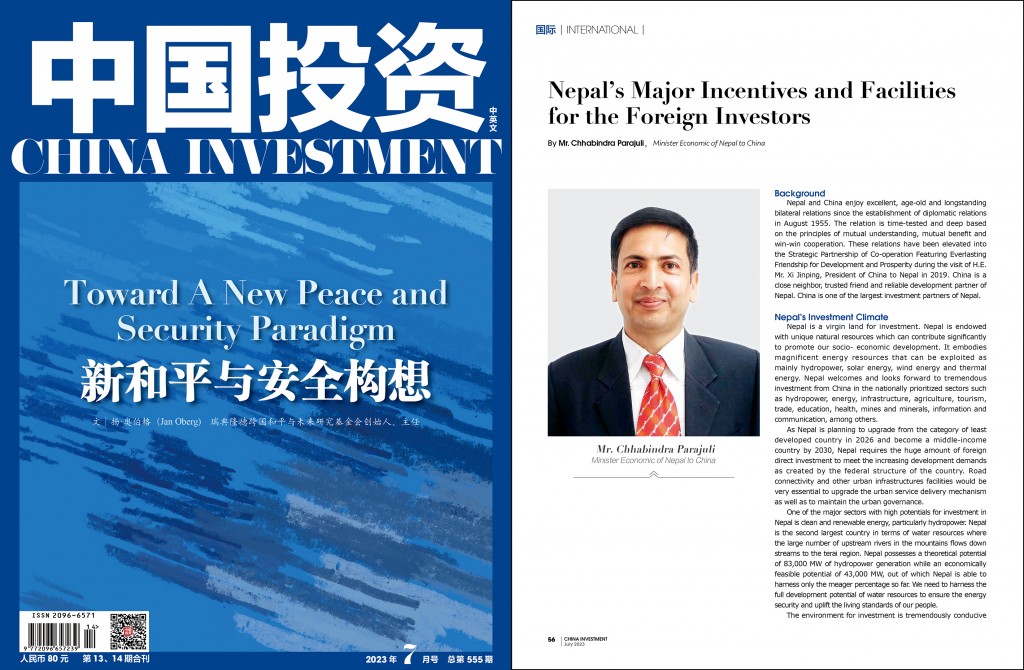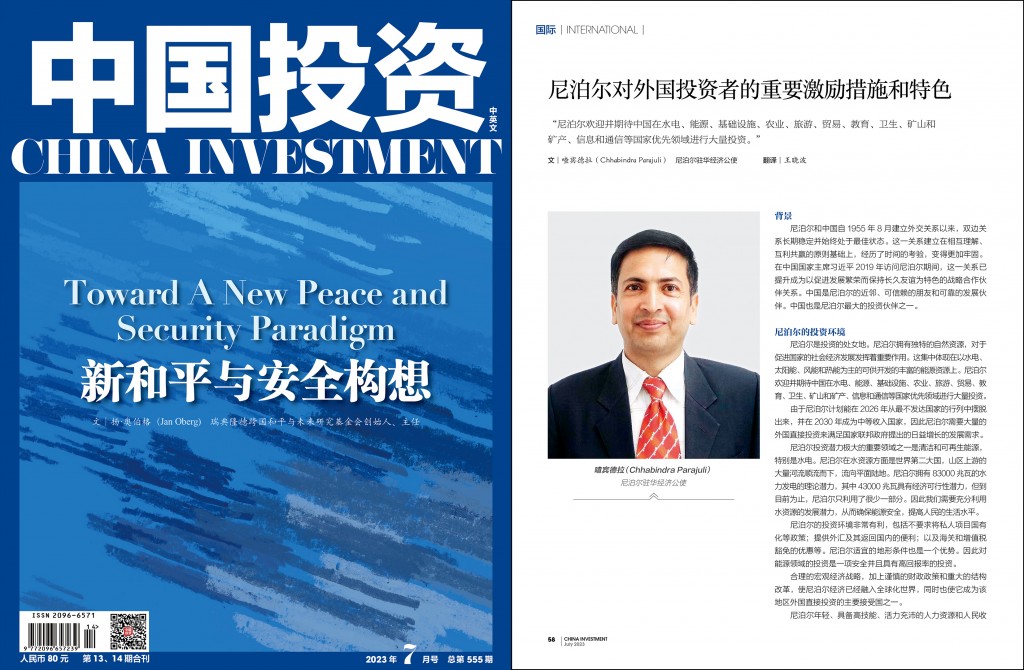By Mr. Chhabindra Parajuli, Minister Economic of Nepal to China
文|喳宾德拉(Chhabindra Parajuli) 尼泊尔驻华经济公使 翻译|王晓波
导读
●背景
●尼泊尔的投资环境
●尼泊尔向投资者提供的投资激励、便利和支持措施
●结语
Background
Nepal and China enjoy excellent, age-old and longstanding bilateral relations since the establishment of diplomatic relations in August 1955. The relation is time-tested and deep based on the principles of mutual understanding, mutual benefit and win-win cooperation. These relations have been elevated into the Strategic Partnership of Co-operation Featuring Everlasting Friendship for Development and Prosperity during the visit of H.E. Mr. Xi Jinping, President of China to Nepal in 2019. China is a close neighbor, trusted friend and reliable development partner of Nepal. China is one of the largest investment partners of Nepal.
Nepal’s Investment Climate
Nepal is a virgin land for investment. Nepal is endowed with unique natural resources which can contribute significantly to promote our socio- economic development. It embodies magnificent energy resources that can be exploited as mainly hydropower, solar energy, wind energy and thermal energy. Nepal welcomes and looks forward to tremendous investment from China in the nationally prioritized sectors such as hydropower, energy, infrastructure, agriculture, tourism, trade, education, health, mines and minerals, information and communication, among others.
As Nepal is planning to upgrade from the category of least developed country in 2026 and become a middle-income country by 2030, Nepal requires the huge amount of foreign direct investment to meet the increasing development demands as created by the federal structure of the country. Road connectivity and other urban infrastructures facilities would be very essential to upgrade the urban service delivery mechanism as well as to maintain the urban governance.
One of the major sectors with high potentials for investment in Nepal is clean and renewable energy, particularly hydropower. Nepal is the second largest country in terms of water resources where the large number of upstream rivers in the mountains flows down streams to the terai region. Nepal possesses a theoretical potential of 83,000 MW of hydropower generation while an economically feasible potential of 43,000 MW, out of which Nepal is able to harness only the meager percentage so far. We need to harness the full development potential of water resources to ensure the energy security and uplift the living standards of our people.
The environment for investment is tremendously conducive including the policies such as not requiring nationalization private projects; availability of foreign exchange and repatriation facility; custom and Value Added Tax (VAT) exemption facilities, among others. Suitable topographical situation of Nepal can be an advantage. Investment in energy sector is a safe investment with high rate of returns.
A sound macroeconomic strategy in combination with prudent fiscal policies and major structural reforms has integrated the Nepali economy into the globalized world, while transforming the country into one of the major recipients of foreign direct investment in the region.
Nepal’s young, high skilled, dynamic capable human capital, rising income standards of the people are some of the enablers for the Chinese investors in Nepal. Additionally, macroeconomic stability, dynamic free and open market economic policy, investors friendly legal, institutional and procedural arrangements, and as well as strong and stable economic growth potential, Nepal offers abundant business and investment opportunities for the Chinese investors in many diverse sectors. Energy, Tourism, Urban Infrastructures development, Mechanization of the Agriculture, Information and Communication Technology, Health and Education, Financial Sector, Mines and Minerals are some of the National prioritized sectors for the foreign direct investment. In Nepal, foreign investors are allowed 100% ownership of a company in a majority of sectors, and repatriation of earnings, company’s profits and bonus are easily allowed. Mega-projects, especially in Construction Industries, Solar Energy generation/Hydropower construction and operation, Urban Infrastructures construction and operation under the public private partnership models- Build Operate Own and Transfer (BOOT), Build Operate and Transfer (BOT), Information and Communication Technologies (ICTs), Tourism Hotels and Hospitality (THHs) sectors are the emerging sectors ready to welcome the Chinese investors.
Nepal is endowed with abundant natural resources but it is still in the primary stage of development. So, Nepal needs huge investment for the infrastructure’s development such as the construction of the provincial capitals, High-tech Manufacturing’s zones (HTMZs), Industrial parks, upgradations of the provincial airports, national roads, railways, urban infrastructures and many more. It is relatively a virgin land for investment destination. Nepal offers multiple opportunities for investment to foreign investors and foreign enterprises from China.
Investment incentives, facilities and support measures what Nepal offers to the investors:
• Nepal is strategically located between two large and rapidly growing economies.
• Nepal has large pool of high skilled human capital (out of total population, about 57% are of working age 15-59 years). Nepal has relatively low cost of labor compared to other countries.
• Nepal is ranked 94th in the World and 3rd in South Asia in “Ease of Doing Business Report 2019” by the World Bank Group.
• Foreign investors are allowed 100% ownership of a company in a majority of sectors. Repatriation of capital, bonus and other profits are easily allowed by law.
• Land ownership is allowed in company’s name.
• On arrival tourist visa allowed for visitors. Business visa for investors, simplified visa process.
• Various bilateral investment protection and double tax avoidance arrangements are in place.
• Nepal has signed Bilateral Investment Promotion and Protection Agreement (BIPPA) with India, Finland, Germany, Mauritius, UK, and France.
• Double Taxation Avoidance Agreement signed with Austria, Bangladesh, China, India, Korea, Mauritius, Norway, Pakistan, Qatar, Sri Lanka and Thailand.
• Compared to other countries in South Asia, Nepal offers the lowest tax burden in the region. Some of the reasons for comparatively high Rate of Investment in Nepal include:
• Huge investment potential in tourism, hydro-power, agriculture, and mine and mineral sectors;
• Abundance of natural resources;
• General income tax rate of 25% (20% in priority sector like Energy, Transport Infrastructure and Manufacturing), Value Added Tax (VAT) of 13%;
• Tax Holiday for specific sectors; → Income tax concession on profits from exports and interest income on foreign loans;
• Withholding tax rate of 15% on royalties and technical & management fees;
• Customs, excise duties, and VAT levied on raw materials and auxiliary raw materials of export-oriented industries is reimbursed to the exporter on the basis of the export amount within 60 days of application.
• Cash incentives scheme on the basis for the export amount for the priorities of exportable products.
• 20 million Nepali rupees is fixed for the minimum threshold Capital for the foreign Direct Investment.
• Special Economic Zones, Hi-tech Industrial parks and Industrial Districts are also offering many facilities and incentives for the foreign investors in Nepal.
Conclusion
Chinese investment in Nepal has been diversified and increasing year on year. On the one hand, Nepal Government is offering an attractive incentives package for the foreign investors and on the other hand, Chinese enterprises have implemented the going global strategy; in this scenario, I strongly believe that Chinese investors will make more investment in Nepal and could be able to explore the more opportunities what Nepal offers to the investors.
Nepal’s drive for socio-economic transformation will require huge amount of investment in almost all the sectors. Nepal and China have signed a Memorandum of Understanding on Belt and Road Initiatives for fostering cooperation in priorities areas. Belt and Road Initiatives (BRI) will help to enhance the connectivity and promote the business cooperation opportunities between the two countries and create new avenues of opportunities for the investments as well.
背景
尼泊尔和中国自1955年8月建立外交关系以来,双边关系长期稳定并始终处于最佳状态。这一关系建立在相互理解、互利共赢的原则基础上,经历了时间的考验,变得更加牢固。在中国国家主席习近平2019年访问尼泊尔期间,这一关系已提升成为以促进发展繁荣而保持长久友谊为特色的战略合作伙伴关系。中国是尼泊尔的近邻、可信赖的朋友和可靠的发展伙伴。中国也是尼泊尔最大的投资伙伴之一。
尼泊尔的投资环境
尼泊尔是投资的处女地。尼泊尔拥有独特的自然资源,对于促进国家的社会经济发展发挥着重要作用。这集中体现在以水电、太阳能、风能和热能为主的可供开发的丰富的能源资源上。尼泊尔欢迎并期待中国在水电、能源、基础设施、农业、旅游、贸易、教育、卫生、矿山和矿产、信息和通信等国家优先领域进行大量投资。
由于尼泊尔计划能在2026年从最不发达国家的行列中摆脱出来,并在2030年成为中等收入国家,因此尼泊尔需要大量的外国直接投资来满足国家联邦政府提出的日益增长的发展需求。
尼泊尔投资潜力极大的重要领域之一是清洁和可再生能源,特别是水电。尼泊尔在水资源方面是世界第二大国,山区上游的大量河流顺流而下,流向平面陆地。尼泊尔拥有83000兆瓦的水力发电的理论潜力,其中43000兆瓦具有经济可行性潜力,但到目前为止,尼泊尔只利用了很少一部分。因此我们需要充分利用水资源的发展潜力,从而确保能源安全,提高人民的生活水平。
尼泊尔的投资环境非常有利,包括不要求将私人项目国有化等政策;提供外汇及其返回国内的便利;以及海关和增值税豁免的优惠等。尼泊尔适宜的地形条件也是一个优势。因此对能源领域的投资是一项安全并且具有高回报率的投资。
合理的宏观经济战略,加上谨慎的财政政策和重大的结构改革,使尼泊尔经济已经融入全球化世界,同时也使它成为该地区外国直接投资的主要接受国之一。
尼泊尔年轻、具备高技能、活力充沛的人力资源和人民收入水平的提升也是中国投资者决定在尼泊尔投资的一些考量因素。此外,宏观经济稳定、充满活力的自由开放的市场经济政策、有利于投资者的法律、制度和程序安排,以及强劲且稳定的经济增长潜力,都为中国投资者在许多不同领域提供了丰富的商业和投资机会。能源、旅游、城市基础设施发展、农业机械化、信息和通信技术、健康和教育、金融行业、矿业和矿产是尼泊尔优先考虑的外国直接投资的领域。在尼泊尔,大多数领域的外国投资者可以100%拥有公司的所有权,其收入、公司利润和奖金也可以很容易地汇回国内。大型项目,尤其是建筑业、太阳能发电和水力发电的建设和运营、采用公私合作模式——建造、运营、拥有和转让或建造、运营和转让的城市基础设施的建设和运营、信息和通信技术,以及旅游酒店和酒店业则是已经准备好迎接中国投资者的新兴领域。
尼泊尔虽然拥有丰富的自然资源,但仍处于发展的初级阶段。因此,尼泊尔需要对基础设施的发展进行巨额投资,比如省会城市、高科技制造区和工业园区的建设以及省级机场、国道、铁路、城市基础设施等的升级改造。从一定程度上讲,尼泊尔是投资目的地的新天地。尼泊尔为来自中国的投资者和企业提供了各种各样的投资机会。
尼泊尔向投资者提供的投资激励、便利和支持措施
● 从战略上讲,尼泊尔位于两个快速增长的大型经济体之间。
● 尼泊尔拥有大量高技能的人力资源(在其总人口中,约57%的人处于15-59岁的工作年龄)。而且与其他国家相比,尼泊尔的劳动力成本相对较低。
● 在世界银行集团发布的2019年营商便利化报告中,尼泊尔排名世界第94位,南亚第3位。
● 在大多数行业,外国投资者可以拥有公司100%的所有权。法律允许资本、奖金和其他利润很容易地返还国内。
● 允许以公司名义拥有土地所有权。
● 游客可凭旅游签证入境。投资者则可办理商务签证,并且简化了签证流程。
● 各种双边投资保护和双重避税措施都已安排到位。
● 尼泊尔已经与印度、芬兰、德国、毛里求斯、英国和法国签署了双边投资促进和保护协定。
● 尼泊尔还与奥地利、孟加拉国、中国、印度、韩国、毛里求斯、挪威、巴基斯坦、卡塔尔、斯里兰卡和泰国签署了避免双重征税协定。
● 与南亚其他国家相比,尼泊尔的税收是该地区最低的。尼泊尔的投资率相对较高的一些原因包括:
● 旅游、水力发电、农业、矿山和矿产领域具有巨大的投资潜力;
● 丰富的自然资源;
● 尼泊尔的一般所得税税率为25%(能源、交通基础设施和制造业等优先领域为20%),增值税为13%;
● 特殊行业享有免税期;出口利润和外国贷款的利息收入享受所得税优惠;
● 特许权使用费和技术管理费的预扣税率为15%;
● 出口导向型工业的原材料和辅助原材料征收的关税、消费税和增值税在出口商提出申请后的60天内根据出口金额退还。
● 现金奖励计划根据出口金额优先考虑可出口产品。
● 2000万尼泊尔卢比是外国直接投资的最低起始资本。
● 经济特区、高科技工业园区和工业区也为在尼泊尔的外国投资者提供了许多便利和激励措施。
结语
中国在尼泊尔的投资已经呈现出多元化趋势,并且在逐年增长。一方面,尼泊尔政府为外国投资者提供了一揽子极具吸引力的激励措施;另一方面,中国企业一直在实施走出去的战略。在这种情况下,我坚信中国投资者将在尼泊尔进行更多投资,并能够充分利用尼泊尔为投资者提供的更多机会。
尼泊尔要推动社会经济转型就需要在几乎所有领域获得大量投资。尼泊尔和中国已经签署了关于“一带一路”倡议的谅解备忘录,旨在促进优先领域的合作。“一带一路”倡议将有助于加强两国之间的互联互通,增进两国的商业合作机会,同时也为投资创造了新的机遇。



